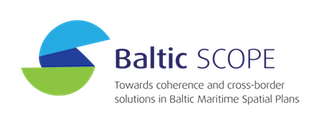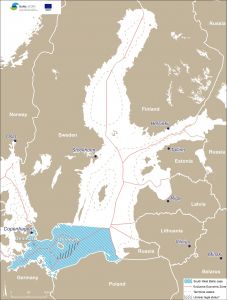The Southwest Baltic is a large case study area where countries border each other in different constellations (territorial waters and EEZ). The area encompasses banks and narrow straits. The Fehmarn Belt (between Germany and Denmark) and Öresund (between Sweden and Denmark) include linear infrastructures such as the Öresund bridge as well as visions for tunnels.
The Southwest Baltic area actually covers a number of geographical areas identified by the respective countries as being important in terms of cross-border cooperation. One is Kriegers Flak, an area spanning Sweden, Germany and Denmark which is important and potentially conflicting for sand and gravel extraction and OWF/energy grid development. There is also the narrow Öresund, where there is no EEZ and which is one of the busiest shipping lanes of the Baltic, and where there are added bilateral issues between Denmark and Sweden (e.g. MPA development and raw material extraction, fisheries). Another important geographical area is the north-east of Bornholm, and another around Middle Bank which is important for Sweden and Poland.
Process towards cross-border cooperation in MSP
This phase aimed at identifying transboundary topics and relevant geographical areas as well as to gather background information and establish relations among project partners. A total of four planners meetings were organized during this phase.
The kick-off meeting took place in Gothenburg, Sweden in March 2015. The working groups on the two case study areas were established, and other practical and administrative issues regarding the organization, financing, and division of work were discussed.
During the discussions, the project partners appeared confident that the project objectives can be achieved… Read more
Transboundary MSP has to pay particular attention to coherence with the existing plans for the German EEZ as well as the respective 12nm zones (MSP Mecklenburg-Vorpommern and Schleswig-Holstein). Furthermore, the transboundary process in this case study area should ensure that Denmark and Poland can align their preparatory and/or start up work on MSP in their countries and that authorities and stakeholders from these neighbouring countries can bring any issues of cross-border concern to the attention of for instance the Swedish planning authority (SwAM) and vice versa. In particular, this case will also enable broad cross-border consultation on the “feasibility study” recently conducted for the Polish MSP with the respective counterparts in Denmark, Sweden and Germany, ensuring that the missing information identified can be collected.
The South West Baltic case study area includes … Read more
Conclusions on the preparatory phase
During this phase the project has achieved the following:
- Initiated the exchange of information between countries involved regarding the MSP status and process in each country.
- Discussed and identified the topics that are most relevant to work with from a transboundary perspective. This has been done through developing topic papers which have been based on input from sector authority’s in the countries.
- Produced a number of maps regarding shipping and socio-economic evidence as well as started worked on compiling energy maps.
- Identified and discussed the geographical areas to be considered when discussing planning solutions.
- Done an inventory of national and regional data relevant for achieving coherent MSP among countries.
- Looked into experiences gained from land-based planning and cross-border cooperation.
- Compiled information about the national maritime spatial planning systems.
- Agreed on how to organise the work ahead (e.g. regarding stakeholder involvement).
Maritime spatial planning updates from the countries
Below an update on the current state of play regarding MSP processes in each of the countries involved in the Southwest Baltic case, including major changes in their legislation and planning systems is provided.
Maritime Spatial Planning in Denmark
Since September 2015, responsibility for the MSP-process in Denmark has moved from the Ministry of Environment and Food to the Ministry of Business and Growth. As part of this transition, the Danish Maritime Authority took over responsibility for MSP and has, therefore, become a new Project Partner in Baltic SCOPE.
Due to these changes, the MSP process (e.g. national work and organization thematic meetings) has been stopped since October 2015. However, Denmark is undergoing legislative work to integrate the EU/89/2016 Directive into their national legal system in order to assure the smooth implementation of MSP. So far, the directive has been transformed into a Draft Act on the Framework on MSP in Denmark. Public hearings on the MSP act concluded in December 2015. It is now being discussed in the Danish Parliament and is expected that the act will come into force during the spring of 2016.
Maritime Spatial Planning in Germany… Read more
According to UNESCO and IOC, the most important reason for stakeholder involvement is to help meet multiple social, economic and ecological objectives in MSP, therefore, stakeholder reflection and deliberation on as many possible expectations, opportunities and conflicts is essential to the development of effective policy solutions. In further explicating the process of involving stakeholders, UNESCO and IOC suggest three important questions to consider from the perspective of effectiveness (e.g., leading toward expected results) and efficiency (e.g., producing expected results at least-cost) when organising stakeholder events:
(a) Who should be involved in the MSP process?
(b) When should stakeholders be involved in the MSP process?
(c) How should stakeholders be involved in the MSP process?
In the context of maritime administration, governance structures have so far been extremely fragmented into well-defined policy sectors with little connection and collaboration between sectors. However, increasing interest in the potential economic opportunities surrounding marine space (Blue growth), as well as environmental concerns about the deteriorating marine environments have created the need for better integration of policy sectors and management of shared seas.
Conflicting interests, administratively fragmented sectors … Read more
Information will follow
The discussion process is organized through the planners, partner and stakeholder meetings.
Please see below the meetings which were held and consult the content by clicking ‘read more’:






